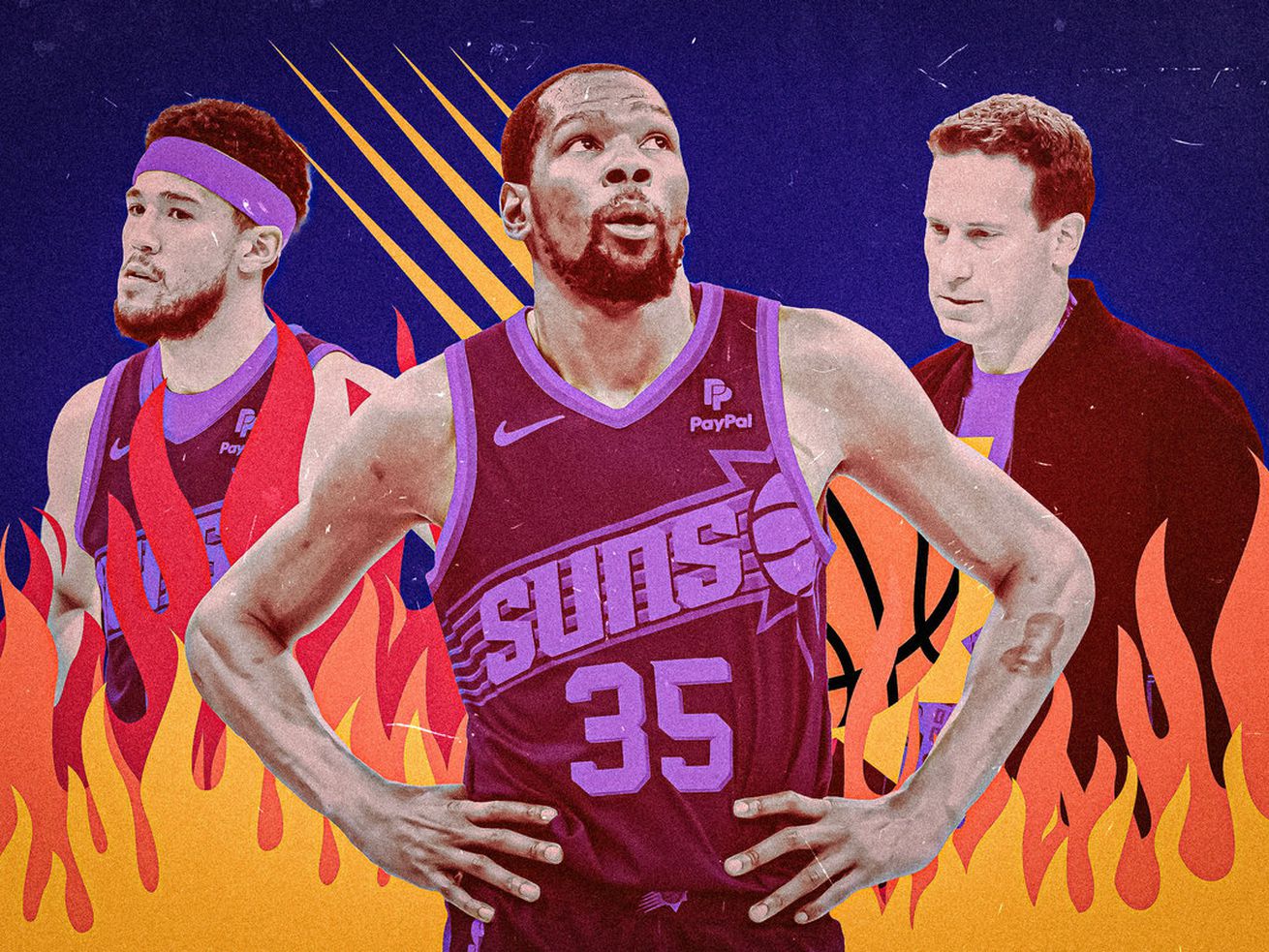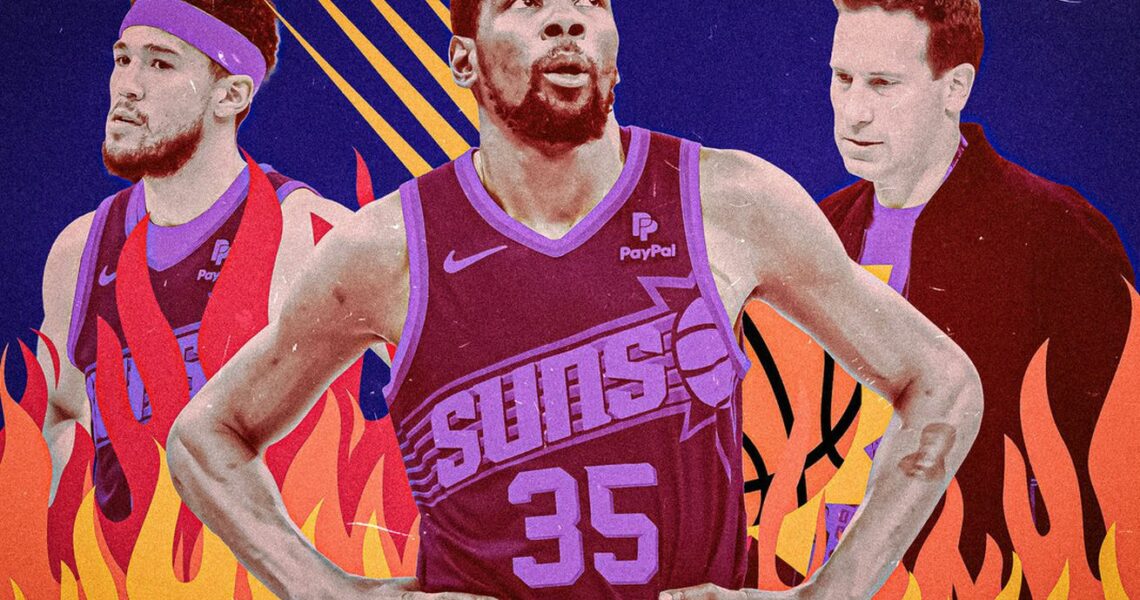
The only thing more depressing than the Suns’ first-round loss? Their future.
The Phoenix Suns are officially cooked. To wrap up a first-round series that rarely felt competitive, the most disappointing, financially reckless, and irredeemably forlorn team in the NBA was swept by the Minnesota Timberwolves on Sunday night. It was a muddy, physical affair that left no doubt about which team is superior.
Despite entering as a plucky 49-win 6-seed that spent all of March and April successfully clawing its way out of the play-in, how Phoenix lost is still shocking. No team with Kevin Durant, Devin Booker, and Bradley Beal should ever get disemboweled in Round 1 like this. Phoenix puttered through important offensive possessions without any direction or urgency—is KD still standing in the corner?—while apathy spread on the other end, where the Suns allowed a playoff-worst 123.2 points per 100 possessions. They helped turn a middling Timberwolves attack into an insoluble onslaught.
Now that their season is over, it’s fair to say that the 2023-24 Suns were little more than a simmering tease, a fistful of immense talent that fooled a lot of people into believing that talent could overcome a lack of any verifiable identity, defensive chops, point guard (oops), or lineup adaptability. Before the season started, I predicted that they would have the most efficient offense in NBA history, a projection based on the fact that Phoenix has three generational scorers who wouldn’t ever have to play in a crowd.
Best-case scenario, I thought they would function like the 2020-21 Brooklyn Nets, a team that (briefly) watched Durant, James Harden, and Kyrie Irving flex their advanced individual skill sets within an isolation-heavy system that was incredibly effective. For my money those Nets almost definitely would’ve won it all had they been healthy, a fun debate that’s definitely worth having. Instead, these Suns proved paper-thin, injury-prone, and, as seen in the playoffs, constructed to dominate a league that no longer exists.
There’s nothing wrong with midrange jumpers launched by deadeye midrange shooters or a get-to-the-rim mentality that leverages the spacing framed by a collection of feared 3-point threats. But the Suns still drew an antiquated shot chart that left points on the board. Grayson Allen’s ankle injury aside, this team should not have finished with the postseason’s second-lowest 3-point rate. To embrace that strategy against a swarming hornet’s nest defense is a recipe for failure, especially as the Wolves got up 7.5 more 3-point attempts per game. Durant is one of the best outside shooters of all time. He launched just eight non-corner 3s and 30 long 2s in this series. That disparity can’t happen in 2024. It’s like having a brick oven and then deciding to heat your pizza with a single lit match instead.
Overall, Phoenix’s Big 3 was “Big” only in name and salary. In 125 minutes with Durant, Beal, and Booker on the court in this series, Phoenix generated 106.8 points per 100 possessions, which is exactly what the last-place Memphis Grizzlies mustered during the regular season. Coming into the playoffs, Phoenix’s offensive rating when Durant, Booker, and Beal shared the court was 120.5, and then 125.8 in 46 minutes against Minnesota in the first round. One can take all this data in and chalk it up as small-sample-size theater against a bona fide title contender that ratcheted up its defensive intensity in all the most important ways. That’d be a little disingenuous, though.
This type of defeat is grounds for a breakup. Unfortunately, that’s where things get thorny. The least effective member of the Suns’ trio has a no-trade clause. Beal’s first season in Phoenix was a rickety nightmare, even worse than skeptics thought it could be. He battled injury after injury and couldn’t develop any workable chemistry with Durant or Booker, complicating a new, reduced role that requires sacrifice and an ability to impact winning in more ways than putting the ball through the rim. In Game 4, Beal finished with nine points, six turnovers, and six fouls in 31 minutes. Somehow, that’s the good news. The bad news: Beal turns 31 in June and is owed $161 million through the 2026-27 season.
Everything about this new reality is depressing if you’re a Suns fan who wistfully remembers how it felt to be up 2-0 in the NBA Finals only three short years ago. To come that close and endure the upheaval that’s happened since, with Booker now the only player from that 2021 Suns roster still in town, is grueling. This isn’t to suggest they would have won this series with some combination of Mikal Bridges, Cam Johnson, Chris Paul, and Deandre Ayton still around, but the path they’re on all but guarantees a more dire future than what they would’ve experienced had more prudent choices been made in the recent past. You can’t go all in, get swept in the first round, stay the course, and be perceived as a serious organization.
If we’re passing around blame pie to explain how the Suns got where they are, the biggest slice doesn’t belong to any players, coaches, or members of the front office because right now the face of this franchise is not Booker or Durant. It’s definitely not Frank Vogel or James Jones. No. This franchise’s face, solely for the worse, now belongs to majority owner Mat Ishbia, who purchased the Suns and Phoenix Mercury for $4 billion in December 2022. Ishbia is unreserved and intractable, two traits that are sadly imbued in the basketball team he buried six feet underground less than two years after he paid enough money for the right to do so.
It was Ishbia who cannonballed into this new gig with an extraordinarily haphazard blockbuster swing for KD before last year’s trade deadline. “I think there is no risk. I don’t look at it as a risk at all,” he said about a trade that sent Bridges, Johnson, Jae Crowder, and four unprotected first-round picks to the Nets for a then-34-year-old in decline who ruptured his Achilles tendon in 2019 and was owed $152 million through the 2025-26 season. “Everyone can say what they want to say. If something happened and we didn’t win, it was still the right thing. You make the decision with the best available information you have at the time, you make the decision and then you run with it and you try to make it work.”
About two months after Ishbia rushed chin first into his new job, he was forced to become aware of the phrase second apron, which threw a haymaker into his original plans by reorienting what is and is not valuable when building a sustainably competitive team. While most of the league recognized how restrictive humongous salaries were and acted with caution, the Suns decided to accrue a tax bill for 2025 that’s estimated to be over $104 million, and then nearly $100 million the following year.
Financial flexibility always mattered. Overnight, it became a necessity. By being well over the second apron, Phoenix won’t have a mid-level exception to use this summer and is unable to aggregate contracts or take back more money than it sends out in a trade. No team is more compromised right now than this one. It’s old, financially handcuffed, and, if it thinks firing Vogel is a genuine salve, also delusional.
It’ll have two first-round picks to trade this offseason—the no. 22 pick in this year’s draft and its own pick in 2031. Maybe it can get someone like Kyle Lowry or Monte Morris to sign a veteran minimum contract and be the starting point guard. Maybe someone like Daniel Theis or Mason Plumlee can replace Drew Eubanks as the backup five. This doesn’t sound like a lot to ask for, but landing everyone it wants with limited resources won’t be easy. And even if it does have a perfect offseason, there are zero guarantees that Phoenix will even make the playoffs next season.
The elephant in the room is Durant. Do the Suns move on from him before he asks out (related: the sky is blue) or has a chance to lose any more value than he currently has? KD is coming off a sensational All-NBA-caliber season and remains a seamless fit on just about any roster. Suitors with enough assets to tempt Ishbia would be aplenty, from the Miami Heat and Cleveland Cavaliers to the Oklahoma City Thunder and New Orleans Pelicans.
Pulling the plug on that partnership would be an admission of failure that doubles as a short-term trot away from championship contention. It could also put the Suns on shaky ground with Booker, who may not have the stomach for any type of rebuild. (From the Suns’ perspective, shopping around a 27-year-old superstar and franchise icon who’s under contract for the next four years would not be wise, regardless of the bounty Phoenix could get for him.) But bringing this foundation back and then shuffling through half a dozen fresh minimum contracts with a new head coach will likely catapult this franchise into years of purgatory and irrelevance.
“I’m going to own this team for 50 years,” Ishbia said last season. For Suns fans who longed to have an owner who’s willing to spend money, the phrase “be careful what you wish for” is currently hitting a little too close to home.

